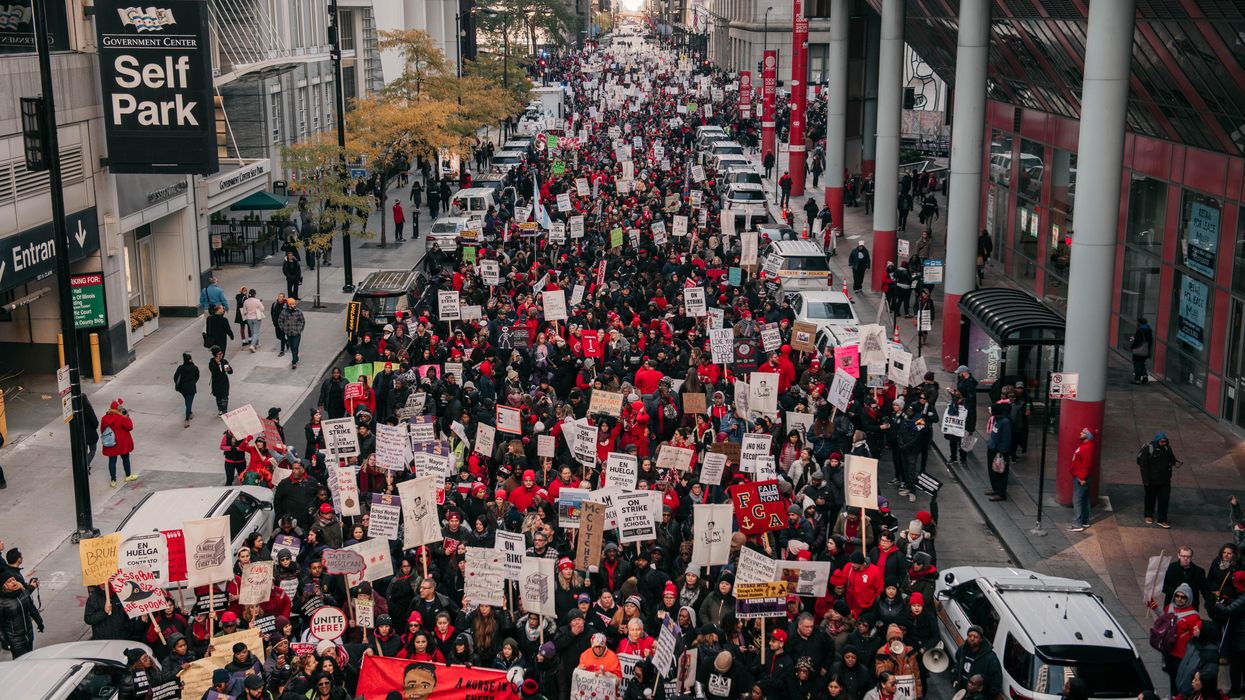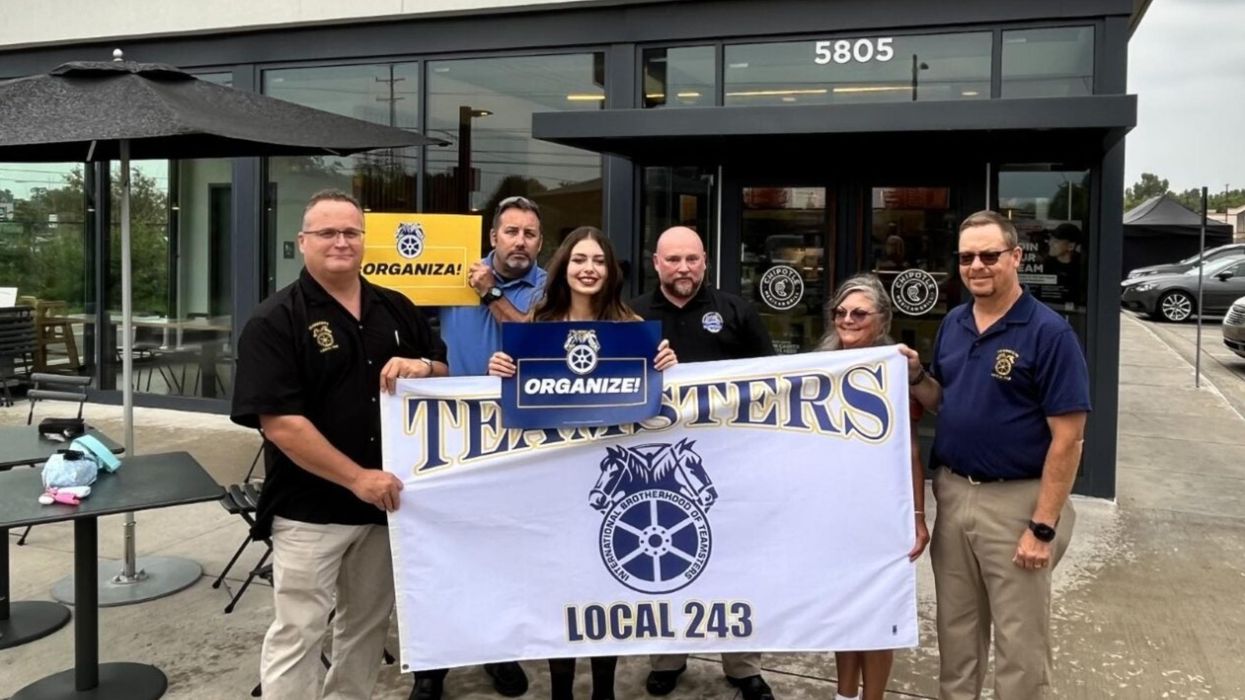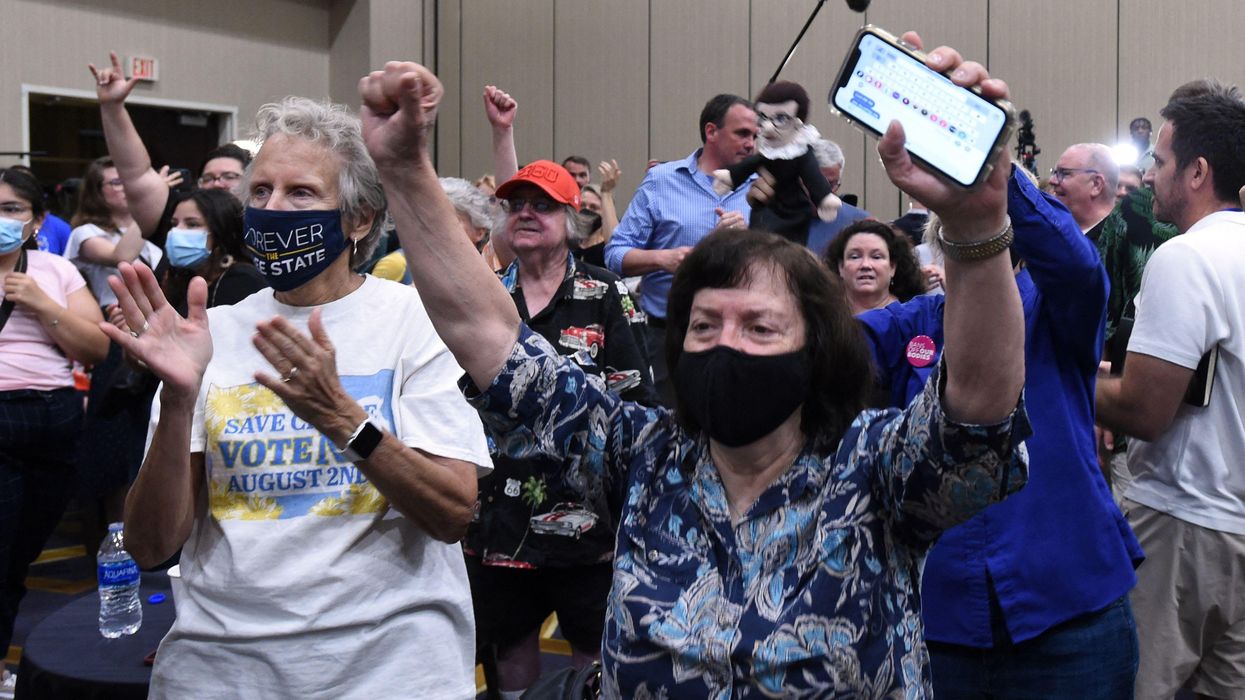Justice for Teachers: The Strike That Started the Red Wave
Ten years ago, Chicago teachers modeled what a militant fight for public education looks like by walking off the job. A decade later, the legacy of social justice unionism continues to animate the U.S. labor movement.
On Sept. 10, 2012, I joined thousands of my fellow public school teachers in Chicago and walked off the job.
As a result of the success by teacher unions in advancing social justice in their bargaining, unions outside of education have also begun to embrace the strategy.
After facing 30 years of corporate education "reform" that demonized teachers and led to massive privatization of public schools across the United States, teachers everywhere were ready to fight back. For many of us in Chicago, ahead of the 2012 strike, political developments had shown a range of possibilities for what that fighting back could look like. We had watched intently as protesters took over plazas in Tahrir Square to demand the overthrow of Egyptian President Hosni Mubarak, as well as the crowds occupying the Wisconsin statehouse to oppose Republican Gov. Scott Walker's anti-union Act 10.
In Chicago, resistance to the attacks on teachers required us to defeat one of the most powerful Democratic politicians in the country (then-Mayor Rahm Emanuel), endure the largest closing of Black schools in U.S. history, and roar back from the brink of an effort to dismantle public education as we know it. But today, ten years after the historic 2012 strike, we have seen the educational justice movement mature and become stronger through a decade of struggle.
The 2012 Chicago Teachers Union (CTU) strike is often referenced as inspiration for an approach to contract negotiations called Bargaining for the Common Good (BCG), where unions make demands that would benefit not just members but the larger communities that they engage with. For example, that year, teachers called for an end to privatization and austerity policies affecting working people, despite being legally restricted on what issues they could bargain over. And during contract negotiations in 2015, the CTU made proposals to pay $15 an hour to all school district employees, even those outside their own membership. Stephen Lerner, a senior fellow at the BCG Network and an architect of SEIU's Justice for Janitors campaign, has pointed to the CTU's 2019 demand for affordable housing for all of Chicago's 20,000 homeless students as emblematic of how the labor movement needs to call for what was previously considered outside the domain of traditional models of collective bargaining.
According to labor historian Joseph McCartin and former President of the Massachusetts Teachers Association, Merrie Najimy, the new approach to bargaining has been adopted by teacher union locals who "understood that there was no way to confront the dynamics of austerity--and especially its devastating impacts on our most vulnerable communities--unless workers and those communities joined together around a shared analysis to advance common goals."
As a result of the success by teacher unions in advancing social justice in their bargaining, unions outside of education have also begun to embrace the strategy. In 2020, around 4,000 Minnesota janitors from SEIU Local 26 led a strike that focused in large part on environmental justice demands. As reported in The Forge, "The demands included the creation of an Owner and Community Green Table; closure of the HERC incinerator, a major source of both greenhouse gasses and air pollution that harms nearby communities of color; and adoption of the union's proposed Green Cleaning Training Program."
A large part of the advance of social justice unionism over the last 10 years has been the use of internal organizing tools to cohere member sentiment around non-traditional demands. For example, in the years leading up to their 2019 strike, organizers with United Teachers Los Angeles (UTLA) held thousands of conversations--in person, on the phone, at rallies, in groups, and one on one--with members, allies and parents. Through a coordinated contract campaign across its 40,000-plus membership, the union built broad consensus around demands that would have an impact outside the classrooms, as well as inside. And, on many fronts, UTLA saw major victories.
No fewer than 20 teacher strikes in the past ten years have injected hope and momentum into the labor movement's landscape, and virtually all of them have adopted a social justice framework. From Arizona to West Virginia, teachers have waged strikes that have led to unprecedented victories in school investment, class sizes, staffing formulas, and common good demands after decades of underfunding, privatization, and demonization of public school teachers and staff. In most of these efforts, teachers have won because they've run strong contract campaigns focused on what organizer and author Jane McAlevey has referred to as "structure tests"--clear-eyed assessments of what it will take to win. Organizers engaged members to take part in escalating actions that advanced a clear set of public good demands.
In many respects, our 2012 CTU strike was a defensive one. We fought off a full scale privatization of the district and an effort to greatly diminish victories won by over 70 years of bargaining history. In the intervening years, our union has gone on an additional nine strikes. Many of these have been the result of the first charter school strikes waged in the country, a process that involved the 2018 merger between the Chicago charter school local, 4343 and the CTU.
The last big strike that the CTU waged was in 2019, and in many respects it was the most transformational. We won a nurse and social worker in every school for the first time in the history of the union. We also saw additional social justice wins that established first-time contract provisions: services and staffing for homeless students, the first "triggers" to limit class sizes in 25 years, the first moratorium on new charter schools, as well as advances in bilingual education and the creation of "sanctuary schools" to protect undocumented students from ICE. What's more, in 2021, the CTU also won a major legislative fight by enacting an elected school board in the city, and eliminated restrictions on bargaining rights that prevented us from reducing class-sizes or addressing the privatization of educational services.
The next "structure test" facing Chicago teachers will be to challenge an unpopular incumbent in Mayor Lori Lightfoot in next year's municipal elections. The next mayor will have the ability to appoint more than half of the school board in 2024 and determine whether or not CTU can win social justice demands in our next contract, including affordable housing for homeless students. Empowering the working class and nurturing vibrant public schools will largely depend on having a progressive city government in Chicago. If 2012 was a fight for the soul of public education, 2023 and beyond will be a fight to determine whether or not union power--locally and nationally--can truly translate into political power.



